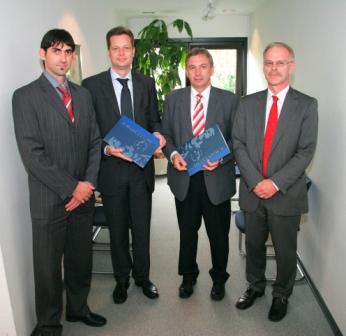
From the left (Photo: umg): Dipl.-Ing. Markus Mladek (MBM), Michael Heinlein (Managing Director MEDNOVO Medical Software Solutions GmbH), Dr. Hans-Joachim Conrad (Executive Board of Management and Administration of the Göttingen University School of Medicine), Prof. Dr. Walter Paulus (Director of the Department of Clinical Neurophysiology).
MBM ScienceBridge GmbH, the technology transfer organization of Göttingen University, has been able to win the company MEDNOVO Medical software Solutions GmbH from Berlin as a licence partner for NEMESYS. "This partnership of science and economy again is a good example how our inhouse innovations are financially sensibly transformed into a marketable product for the single scientist and for Göttingen University", says Dr. Hans-Joachim Conrad, Executive Board of Management and Administration of the Göttingen University School of Medicine. The two partners have now signed a cooperation agreement.
NEMESYS is an absolute novelty in its function and its applicability in neurology: NEMESYS runs as a client-server-application on a database. By digital connection to neurological derivation devices (e.g. EEG, EMG), it is possible for the first time to work on different networked workplaces. Moreover, NEMESYS simplifies and standardizes the findings documentation in the area of Clinical Neurophysiology. The new system provides finding modules for the essential neurodiagnostical examination proceedings like EEG, EMG, EP, transcranial magnet stimulation, doppler-/ duplex sonography and EEG monitoring.
NEMESYS was certified by the German Society for Clinical Neurophysiology and Functional Imaging (DGKN). The extent of documentation as well as structure and classification of the findings modules were developed in arrangement with the DGKN and geared at international documentation standards.
Professor Walter Paulus, Director of the Department of Clinical Neurophysiology at the UKG: "We are pleased to have found an innovative partner like the company MEDNOVO, who will not only market but also enhance NEMESYS."
MEDNOVO offers the system NEMESYS as an additional module for its product family MediColor, an imaging and findings documentation system in functional diagnostics. Michael Heinlein, Managing Director of MEDNOVO Medical Software Solutions GmbH: "With the acquisition of NEMESYS we can complement the content of our system MediColor very well. In the near future, we will offer MediColor-Nemesys not only in Germany but also internationally."
NEMESYS is already in use at the University Hospital of the Georg-August-University Göttingen, at the Hospital Bremen-East, and at the Hospital of the Johannes-Gutenberg-University Mainz.
About the Department of Clinical Neurophysiology at Göttingen University
The main emphasis of the research at the Department of Clinical Neurophysiology at Göttingen University is focused on the field of epilepsy and Morbus Parkinson as well as on the further development of the methods documented in NEMESYS. Moreover, an English NEMESYS version shall carry this documentation standard also to the Anglo-Saxon countries. For further information, please visit www.neurologie.uni-goettingen.de
About MBM Science Bridge GmbH
The MBM Science Bridge GmbH is the technology transfer organization of the University and operates as a mediator between inventors and industry partners. For further information, please visit www.sciencebridge.de
About MEDNOVO Medical Software Solutions GmbH
The MEDNOVO Medical Software Solutions GmbH is specialized in the de-velopment of medical documentation systems and the connection and integration of medical devices with various hospital information systems (HIS). For further information, please visit www.mednovo.de